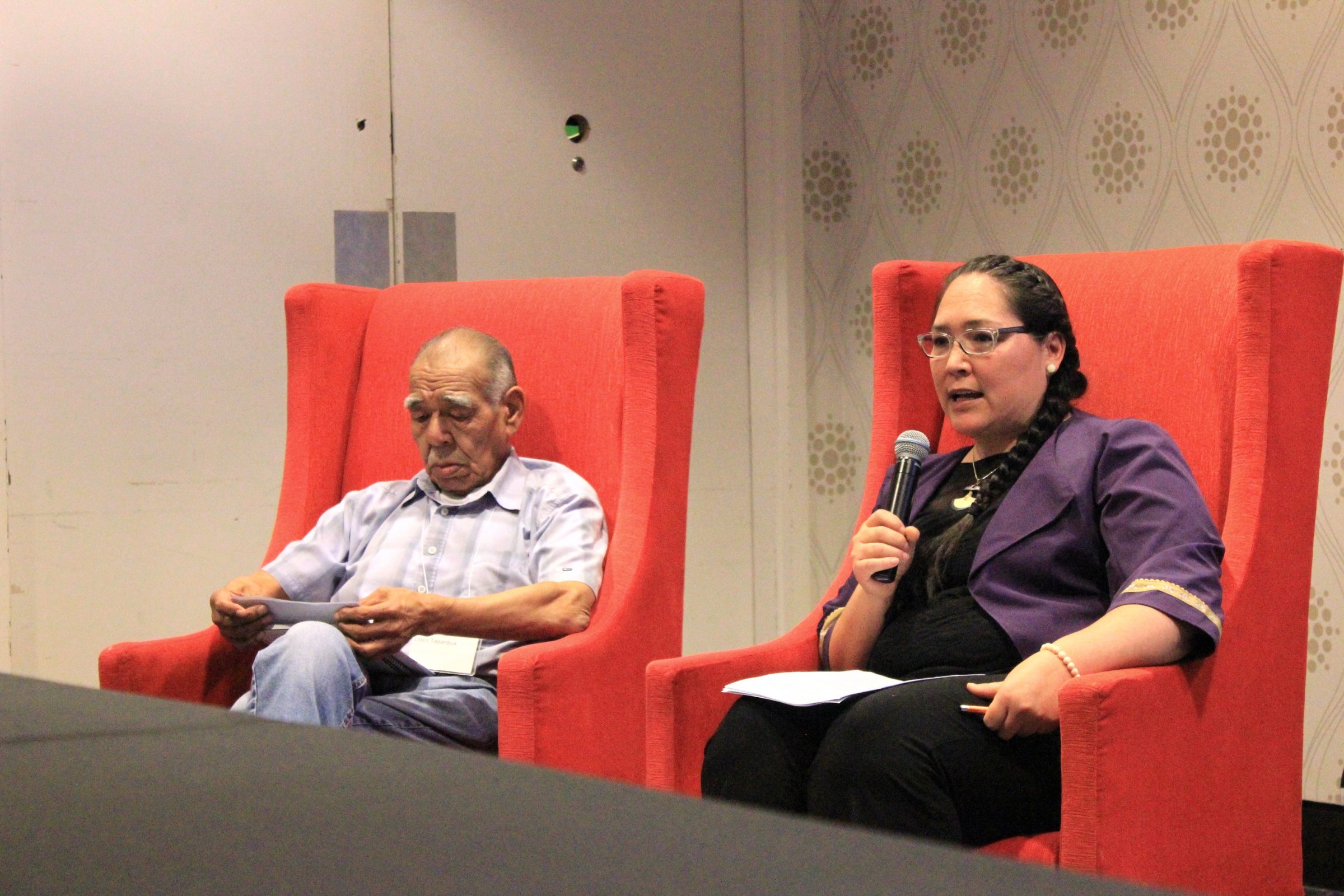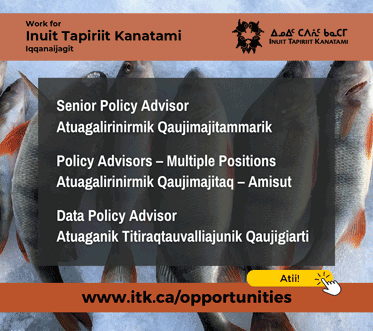Inuit exert language rights at Montreal conference with Inuktut-only panel
“The name of it is Inuit Studies Conference so it makes sense … that we wanted to use an Inuit language”
Nunavut Tunngavik Inc. president Aluki Kotierk, right, speaks on a panel entitled “Inuktut as a human right” on Thursday, Oct. 3, at the Inuit Studies Conference in Montreal. With her is Louis Tapardjuk, board member of Inuit Uqausinginnik Taiguusiliuqtiit, Nunavut’s language authority. Despite the absence of translation, the two spoke entirely in Inuktut. (Photo by Lisa Gregoire)
A Montreal hotel conference room was abuzz on Thursday, Oct. 3, as people attending the 21st annual Inuit Studies Conference streamed in to hear two Inuit leaders talk about why speaking Inuktut in Nunavut is a human right and how that right is casually denied.
Nunavut Tunngavik Inc. president Aluki Kotierk and Louis Tapardjuk, a former Nunavut government minister and board member of Inuit Uqausinginnik Taiguusiliuqtiit, Nunavut’s language authority, arrived on time and sat in two comfortable wingback chairs at the front of the room.
Camera operators set up to live-stream the event to NTI’s Facebook page, a screen projection offered the audience various conference hashtags to use and a link to English-language speaking notes, and the mostly Inuit audience settled in for the talk.
Kotierk welcomed her audience and began the discussion in Inuktitut. Inuktitut-speakers responded from time to time with nods of agreement and applause. Those who couldn’t speak Inuktitut, this writer included, sat and stared. Some people left the room. Some leaned over and privately scrolled their phones, waiting for the English part.
There was no English part.
Welcome to the bewildering world of many Inuit in Nunavut.
“The name of it is Inuit Studies Conference so it makes sense, particularly when we’re talking about Inuit languages, that we wanted to use an Inuit language,” Kotierk said following the presentation.
“Both Louis and I spoke about it and knew there would be no interpretation but decided it was crucially important that we use our language when we’re talking about the need to support and continue to have our language thrive.”
The international conference, which brings together Arctic experts from the North and south, has, in recent years, begun to include more Inuit speakers and presenters, more panels relevant to Inuit needs and more collaborations between Inuit and non-Inuit academics. This Inuktitut panel, about language as human right, appeared to symbolize that evolution.
Kotierk’s speaking notes, which can be found here, outline numerous laws that ought to promote and protect Inuktut in Nunavut where the majority population is Inuit and the majority language spoken is Inuktut.
Those laws range from the United Nations Declaration on the Rights of Indigenous Peoples to the calls to action and justice from the Truth and Reconciliation Commission and the National Inquiry into Murdered and Missing Indigenous Women and Girls, and territorial language laws in Nunavut.
Kotierk listed several recent examples where Inuit deaths were attributed, at least in part, to language and culture barriers, such as that of Annie Kootoo, who died of acute liver failure in 2017, and 15-year-old Ileen Kooneeliusie, who died from tuberculosis that same year.
“Inuit want to live with dignity and have the human right to do so. Inuit Canadians should not be dying because they are unable to access and receive essential services on an equitable basis with other Canadians,” Kotierk wrote in her speaking notes.
In his speaking notes, Tapardjuk described a recent incident in Iqaluit where RCMP officers visited an elder to tell her that her adopted son had been stabbed to death at a young offenders facility. The woman was alone and did not speak English. Tapardjuk said police officers had to stop a vehicle and ask someone to help them deliver the traumatic news.
“There are a number of protocols in that scenario that should be followed in terms of does the person have support when you’re coming with life-altering information, let alone an interpreter,” Kotierk told Nunatsiaq News.
“So many of us Inuit who speak English and Inuktitut are often called to do this. We are expected to interpret in any given situation, even if we don’t know the people. Sometimes it’s confidential information. So that, I would say, is another breach of human rights.”
Kotierk said at the very least, Inuktut-speakers in Nunavut should have access to frontline service in their language in the areas of health care, justice and education. But even those aren’t guaranteed.
She and other leaders continue to call on the federal government to protect language and dignity in their homeland. Ottawa passed its new Indigenous Languages Act in June to much criticism from NTI and Inuit Tapiriit Kanatami, who said it ignored most of their suggested amendments.
Kotierk says she wants Inuit to know, “we are the ones in power. Let’s speak Inuktut when we go to the store. Let’s speak Inuktut when we go to the bank. Let’s speak Inuktut when we go to the school. The more we speak Inuktut, and not accommodate other people who cannot understand, the more it will be a given that it needs to be used.”






I have no problem with presenters at an Inuit Studies Conference speaking Inuktitut, but the conference may want to rethink their decision to not provide any translation services.
.
Whenever you seek to distribute knowledge, to promote discussion, or to convince people of your point of view it is essential that the people you are communicating with actually understand what you are saying.
.
I see the position taken by Ms. Kotierk as an ill thought out attempt to make a point, one which is a big fail.
Maybe you read the article too fast
Or are one of the people who left the room
?
It appears information was provided in english – something Inuit do not have the luxury of (info in their own language)
Then create it. Bemoaning it might offer a brief catharsis, but will change absolutely nothing.
I did read the article, and did note that English speaking notes were available. My point is that at a conference where it is known that multiple languages will be spoken, or where there are a sizeable number of participants speaking different languages, it is common for simultaneous translation to be used.
.
Any reasonable venue in Montreal should have facilities to provide this service, and I would think that Inuktitut, English, and French simultaneous translation would have been available.
.
This would allow for all speakers and participants to gain the greatest possible understanding from the conference.
In this case, I disagree that translation services should have been provided. I’ve attended a conference that was advertised in English and only French was spoken where there were was no interpretation service. Thoudands of dollars of GN money was wasted on that trip because they wouldn’t offer interpretation service for me. Apparently a langage provider in Canada only means French language provider. Why should Inuit always have to be the ones conforming or bending backwards?
Inuit are very far from the “ones bending over backwards“.
Speakers of Arabic, Cantonese, Cree, Filipino, Urdu, etc., of whom there are vastly more in Canada then there are speakers of any Inuit languages, make the same accommodations.
If you want to get your message across to a Canada-wide audience, use English and/or French, the same as any other linguistic minority in the country.
If you want to speak a regional or minority language there’s absolutely nothing wrong with it and it should be encouraged, just don’t expect to reach a Canada-wide audience.
This is the way it is for everyone in Canada.
Agreed. The title of the talk was “Inuktut as a human right”, at a conference with the theme “Tukisiqattautiniq”, so it would have been somewhat odd for English or French to play a role. I went to this session. While I am not fully fluent, both Kotierk and Tapardjuk are clear speakers, and, while I got lost more times than I would have liked, I could follow along reasonably well. That I couldn’t understand everything has nothing to do with Kotierk or Tapardjuk; it has to do with me not yet being fully fluent in the language. That’s my problem, not theirs. That the entire session was conducted in Inuktitut, with no accommodation for any other language, was strong, was inspiring, and was important. I’d be surprised if anyone – anyone – left that room thinking otherwise. And if that constitutes a first step towards a future of this conference where presentations not in Inuktut are the oddities, then that’s a pretty good message to send.
That’s all well and good, but it does nothing to raise the profile of Inuktut among the rest of Canada. If it raises self-esteem within a community, that is laudable, but it is also isolating the community, and limiting the opportunity of gaining allies and support.
You ROCK Aluki Kotierk! I so believe in you. Let’s all inuit talk inuktut, our mother tongue,
Kind of an ironic comment
You can cite human rights and the legal mechanisms that protect Inuktitut, but in a way these are only abstractions, the more immediate issue is what plans are there in place to pass it along to the next generation? When it disappears will you decry the violation of your rights? It seems a hollow victory awaits.
Our leaders do not appear to understand that Inuit have
been in charge of teaching Inuktitut for almost 40 years.
A lot of work has to be done at the community level
if Inuktitut is going to survive. This is not happening !
A qualified Inuktitut teacher for non – speakers of Inuktitut
would be very good.
All we get from our highly paid leaders is the same pointless
drivel, meeting after meeting, nothing ever happens.
This Inuk person, is still wondering ?
No translation was a notable absence. There where some unilingual Inuit who were not getting informed as Engligh speaking persons. Even keynote speeches very speaker language only.
Sure those who do not have Inuktitut will walk out as they will not get any worthy information. Inuktitut only speaker ususally get a friend to give an interpetation.
Inuit Studies is giving some Inuit opportunity to speak, but the language itself is not getting due respect.
Seems so unrealistic to have the Inuit Studies Conference in Montreal, shoulda been held in Nunavut where everything ties within our language
Well since it was sponsored by UQAM I’m thinking that they would pretty well require that it be held in Montreal.
.
Also it’s not unusual for a large conference, which draws participants from across the country, and around the world, to be held in a large city that is easy to reach for domestic and international flights.
.
The speaker’s list shown on the website showed about 400 participants. Maybe each Nunavut community could take a turn hosting it each year. Might need a bigger hotel. And a conference centre. And more restaurants.. Not unrealistic at all. /s
There has been a number of Inuit Studies conferences in the past decades and some of them took place in Iqaluit, Nuuk and other places in the North. Some also took place in the south, like Montreal and it’s a way to get more people to attend and share their knowledge.
This is a way to make non Inuit understand how Inuit feel when they are forced to seek services in a second language. It’s only a conference, so no consequences, but for Inuit that seek medical attention, in particular when they are sent in southern hospitals, or face the court system where everything is in English, by people of another culture who do not speak Inuktut, the stakes are much higher.
Yes, but it is also extremely reasonable to expect every Canadian, regardless of ethnic group, to speak one of Canada’s official languages.
It is also far more efficient to have the few thousands who don’t know effective English or French learn one of the languages that they should know as Canadians.
Hundreds of thousands of people in this country face the medical system and the court system who don’t have English or French as a first language, and for whom it is vastly culturally different, every day of the week.
Inuit are no different.
In the end it’s only a small few who are communicating with each other here, it is inconsequential in a way. Yet, could it also be that what might look like a small victory turns out being a larger defeat when no one hears, and subsequently cares, about the message?